Eucratides I
Eucratides I (Greek: Εὐκρατίδης Α΄; reigned c. 171–145 BC), sometimes called Eucratides the Great, was one of the most important Greco-Bactrian kings, descendants of dignitaries of Alexander the Great. He uprooted the Euthydemid dynasty of Greco-Bactrian kings and replaced it with his own lineage. He fought against the Indo-Greek kings, the easternmost Hellenistic rulers in northwestern India, temporarily holding territory as far as the Indus, until he was finally defeated and pushed back to Bactria. Eucratides had a vast and prestigious coinage, suggesting a rule of considerable importance.
| Eucratides I | |
|---|---|
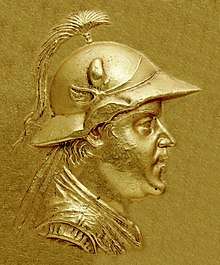 Portrait of Eucratides | |
| Greco-Bactrian king | |
| Reign | 171–145 BC |
| Father | Possibly Heliokles |
| Mother | Possibly Laodice |
Biography
Coup d'état
Eucratides came to the throne by overthrowing the dynasty of Euthydemus I in Bactria, whose son Demetrius was conquering northwestern India. The king whom Eucratides dethroned in Bactria was probably Antimachus I.
It is unclear whether Eucratides was a Bactrian official who raised a rebellion, or, according to some scholars,[1] a cousin of the Seleucid king Antiochus IV Epiphanes who was trying to regain the Bactrian territory. Justin explains that Eucratides acceded to the throne at about the same time as Mithridates, whose rule is accurately known to have started in 171 BC, thereby giving an approximate date for the accession of Eucratides:
- "Around the same time, two great men started to rule: Mithridates among the Parthians, and Eucratides among the Bactrians" Justin XLI,6[2]
Some of the coins of Eucratides probably represent his parents, where his father is named Heliocles, and his mother, who is thought to be Laodice,[3] is wearing a royal diadem. Laodice may have been a member of the Seleucid imperial house.
Having become master of Bactria, Eucratides also conquered the western parts of the Indo-Greek kingdom. According to the single remaining source, Roman historian Justin, Eucratides defeated Demetrius of India, but the identity of this king is uncertain: he could be either Demetrius I, or Demetrius II.
- "Eucratides led many wars with great courage, and, while weakened by them, was put under siege by Demetrius, king of the Indians. He made numerous sorties, and managed to vanquish 60,000 enemies with 300 soldiers, and thus liberated after four months, he put India under his rule" Justin XLI,6[4]
Numismatic evidence suggests that Eucratides I was a contemporary of the Indo-Greek kings Apollodotus I, Antimachus II and Menander I. In any case, Eucratides' advances into India are proved by his abundant bilingual coinage.
In the west the Parthian king Mithradates I began to enlarge his kingdom and attacked Eucratides; the city of Herat fell in 167 BC and the Parthians succeeded in conquering two provinces between Bactria and Parthia, called by Strabo the country of Aspiones and Turiua.
Eucratides I is most likely the founder of Eucratideia.
Death
Justin ends his account of Eucratides' life by claiming that the warlike king was murdered on his way back from India by his own son (either Eucratides II or Heliocles I, although there are speculations that it could be his enemy's son Demetrius II), who hated his father so much that he dragged his dead body after his chariot:
- "As Eucratides returned from India, he was killed on the way back by his son, whom he had associated to his rule, and who, without hiding his patricide, as if he didn't kill a father but an enemy, ran with his chariot over the blood of his father, and ordered the corpse to be left without a sepulture" Justin XLI,6[5]
The murder of Eucratides probably brought about a civil war amongst the members of the dynasty. The successors to Eucratides were Eucratides II and Heliocles I (145–130 BC), who was the last Greek king to reign in Bactria. Once the Yuezhi tribes overpowered Heliocles, the Greco-Bactrians lost control of the provinces north of the Hindu Kush.
Two other members of the dynasty were Plato of Bactria and probably Demetrius II, who in that case was not identical with the king Justin claimed was the enemy of Eucratides I.[6]
The rule of the Greco-Bactrians soon crumbled following these numerous wars:
- "The Bactrians, involved in various wars, lost not only their rule but also their freedom, as, exhausted by their wars against the Sogdians, the Arachotes, the Dranges, the Arians and the Indians, they were finally crushed, as if drawn of all their blood, by an enemy weaker than them, the Parthians." Justin, XLI,6[5]
However, the rule of the Indo-Greeks over territories south of the Hindu Kush lasted for a further 150 years, ultimately collapsing under the pressure of the Yüeh-chih and Scythian (Saka) invasions in around 10 BC, with the last Indo-Greek ruler Strato II.
Sources
Full account of Justin on Eucratides:
"Almost at the same time that Mithridates ascended the throne among the Parthians, Eucratides began to reign among the Bactrians; both of them being great men. But the fortune of the Parthians, being the more successful, raised them, under this prince, to the highest degree of power; while the Bactrians, harassed with various wars, lost not only their dominions, but their liberty; for having suffered from contentions with the Sogdians, the Drangians, and the Indians, they were at last overcome, as if exhausted, by the weaker Parthians. Eucratides, however, carried on several wars with great spirit, and though much reduced by his losses in them, yet, when he was besieged by Demetrius king of the Indians, with a garrison of only three hundred soldiers, he repulsed, by continual sallies, a force of sixty thousand enemies. Having accordingly escaped, after a five months’ siege, he reduced India under his power. But as he was returning from the country, he was killed on his march by his son, with whom he had shared his throne, and who was so far from concealing the murder, that, as if he had killed an enemy, and not his father, he drove his chariot through his blood, and ordered his body to be cast out unburied."
— Justin, Epitome of the Philippic History of Pompeius Trogus, XLI 6.1-5, IIe CE.[7]
Modern
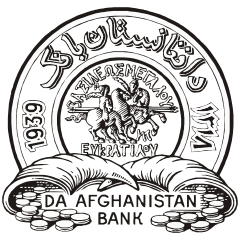
Da Afghanistan Bank which is the central bank of Afghanistan, in its seal has a Eucratides I-era coin having the Greek text, "ΒΑΣΙΛΕΩΣ ΜΕΓΑΛΟΥ ΕΥΚΡΑΤΙΔΟΥ" which means “Of the great king Eucratides.”
Coins
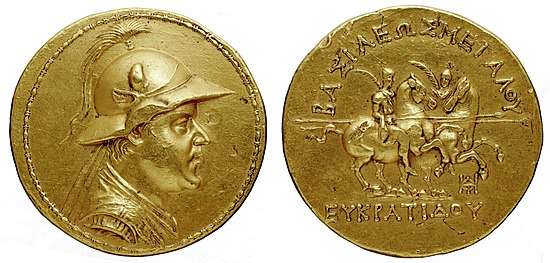 The Gold 20-stater coin of Eucratides weighs 169.2 grams, and has a diameter of 58 millimeters. It was originally found in Bukhara, and later acquired by Napoleon III. Cabinet des Médailles, Paris.[8]
The Gold 20-stater coin of Eucratides weighs 169.2 grams, and has a diameter of 58 millimeters. It was originally found in Bukhara, and later acquired by Napoleon III. Cabinet des Médailles, Paris.[8] Silver tetradrachm of King Eucratides I (171–145 BC). Obv: Bust of Eucratides, helmet decorated with a bull's horn and ear, within bead and reel border. Rev: Depiction of the Dioscuri, each holding palm in left hand, spear in righthand. Greek legend: ΒΑΣΙΛΕΩΣ ΜΕΓΑΛΟΥ ΕΥΚΡΑΤΙΔΟΥ (BASILEŌS MEGALOU EUKRATIDOU) "Of Great King Eucratides". Mint monogram below. Characteristics: Diameter 34 mm, weight 16.96 g, Attic standard.[9]
Silver tetradrachm of King Eucratides I (171–145 BC). Obv: Bust of Eucratides, helmet decorated with a bull's horn and ear, within bead and reel border. Rev: Depiction of the Dioscuri, each holding palm in left hand, spear in righthand. Greek legend: ΒΑΣΙΛΕΩΣ ΜΕΓΑΛΟΥ ΕΥΚΡΑΤΙΔΟΥ (BASILEŌS MEGALOU EUKRATIDOU) "Of Great King Eucratides". Mint monogram below. Characteristics: Diameter 34 mm, weight 16.96 g, Attic standard.[9]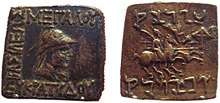 Bilingual coin of Eucratides in the Indian standard (Greek on the obverse ΒΑΣΙΛΕΩΣ ΜΕΓΑΛΟΥ ΕΥΚΡΑΤΙΔΟΥ "Of Great King Eucratides", Pali in the Kharoshthi script on the reverse)
Bilingual coin of Eucratides in the Indian standard (Greek on the obverse ΒΑΣΙΛΕΩΣ ΜΕΓΑΛΟΥ ΕΥΚΡΑΤΙΔΟΥ "Of Great King Eucratides", Pali in the Kharoshthi script on the reverse) Coin of Eucratides with parents Heliokles and Laodike. Greek legends: ΒΑΣΙΛΕΥΣ ΜΕΓΑΣ ΕΥΚΡΑΤΙΔΗΣ "Great King Eucratides" and ΗΛΙΟΚΛΕΟΥΣ ΚΑΙ ΛΑΟΔΙΚΗΣ "Son of Heliokles and Laodike".
Coin of Eucratides with parents Heliokles and Laodike. Greek legends: ΒΑΣΙΛΕΥΣ ΜΕΓΑΣ ΕΥΚΡΑΤΙΔΗΣ "Great King Eucratides" and ΗΛΙΟΚΛΕΟΥΣ ΚΑΙ ΛΑΟΔΙΚΗΣ "Son of Heliokles and Laodike".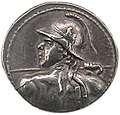 Coin of Eucratides, holding a spear
Coin of Eucratides, holding a spear
 Eucratides I, Scythian imitation, end of 2nd century BC
Eucratides I, Scythian imitation, end of 2nd century BC
See also
Notes
- Tarn
- "Eodem ferme tempore, sicut in Parthis Mithridates, ita in Bactris Eucratides, magni uterque uiri regna ineunt." tml Justin XLI,6
- Astin, A. E. (1990). The Cambridge Ancient History. Cambridge University Press. p. 401. ISBN 978-0-521-23448-1.
- Justin on Demetrius: "Multa tamen Eucratides bella magna uirtute gessit, quibus adtritus cum obsidionem Demetrii, regis Indorum, pateretur, cum CCC militibus LX milia hostium adsiduis eruptionibus uicit. Quinto itaque mense liberatus Indiam in potestatem redegit." Justin XLI,6
- Justin XLI,6
- "Demetrios II of Bactria and Hoards from Ai Khanoum" by L.M. Wilson (Oriental Numismatic Society newsletter nr 180)
- Translation: John Selby Watson 1853
- Homren, Wayne (23 November 2014). "The Biggest Ancient Coins". Vol. 17 no. 48. Numismatic Bibliomania Society. Retrieved 13 April 2018. Cite magazine requires
|magazine=(help) - Monnaie, Eucratide I. (roi de Bactriane) Autorité émettrice de. [Monnaie : 20 Statères, Or, Incertain, Bactriane, Eucratide I].
- O. Bopearachchi, "Monnaies gréco-bactriennes et indo-grecques, Catalogue raisonné", Bibliothèque Nationale, Paris, 1991, p.453
- Quintanilla, Sonya Rhie (2 April 2019). "History of Early Stone Sculpture at Mathura: Ca. 150 BCE - 100 CE". BRILL – via Google Books.
References
- The Shape of Ancient Thought. Comparative studies in Greek and Indian Philosophies by Thomas McEvilley (Allworth Press and the School of Visual Arts, 2002) ISBN 1-58115-203-5
- Buddhism in Central Asia by B. N. Puri (Motilal Banarsidass Pub, January 1, 2000) ISBN 81-208-0372-8
- The Greeks in Bactria and India, W. W. Tarn, Cambridge University Press.
External links
| Wikisource has the text of the 1911 Encyclopædia Britannica article Eucratides. |
| Preceded by: Demetrius and his sub-kings: (in Bactria) Antimachus I Demetrius II (In the Paropamisade, Arachosia, Gandhara) Apollodotus I Antimachus II |
Greco-Bactrian Ruler (Bactria, Paropamisade, Arachosia, Gandhara) 171–145 BC |
Succeeded by: (In Bactria) Eucratides II Plato Heliocles I (In Paropamisade, Arachosia, Gandhara) Menander I |